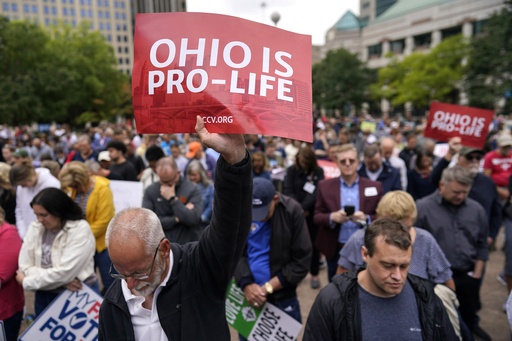COLUMBUS, Ohio — A ruling from a judge has determined that an Ohio law mandating the cremation or burial of fetal or embryonic remains from surgical abortions is unconstitutional. This law violates the reproductive rights amendment that voters in Ohio approved in 2023, resulting in a permanent block on the legislation.
Last week, Hamilton County Judge Alison Hatheway delivered this verdict in response to a lawsuit filed by several clinics alongside the ACLU of Ohio. A prior stage of the legal challenge highlighted the lack of regulations, such as whether a death certificate would be necessary, which was argued to render compliance with the law impossible.
The legislation, enacted in 2020, sought to modify existing Ohio law that allows for the disposal of aborted fetuses in a “humane manner” without explicitly defining the term. Advocates against abortion claimed that the revised law would ensure dignity for remains, while supporters of reproductive rights considered it another tactic by the state’s Republican-majority legislature aimed at undermining lawful abortion access.
Judge Hatheway stated that if the law, known as S.B. 27, went into effect, it would significantly obstruct access to abortion, ultimately leading to delays or denial of necessary healthcare. She observed a conspicuous lack of argument from the state on why the law should remain, indicating it “simply does nothing to serve patient health.”
The judge dismissed the state’s argument that the law would only affect fetal tissue and not access to abortion. She noted that the legislation required providers to inform individuals seeking abortions of this new requirement before they proceeded, alongside establishing necessary ties with crematoriums and funeral homes that did not currently exist.
This ruling is seen as a conclusion to a prolonged legal dispute that began in 2021 against the Ohio Department of Health and others. The ACLU and clinics contended that the law introduced an unconstitutional obstacle to women’s rights to abortion and classified it as “frivolous and medically unnecessary.”
These constitutional concerns were complicated following the 2022 U.S. Supreme Court decision that overturned Roe v. Wade, a ruling that had safeguarded abortion rights for nearly five decades. This change prompted several states, including Ohio, to pursue constitutional amendments to protect abortion rights locally.
The recent ruling allows surgical abortion remains to continue being managed under established Ohio laws regarding infectious waste, enabling them to be disposed of alongside other medical waste. ACLU cooperating attorney Jessie Hill expressed relief at the finality of the ruling, stating it would enable their clients to concentrate on providing essential healthcare services. She recognized the ruling as a strong affirmation of Ohio’s Reproductive Freedom Amendment.
Kellie Copeland, the executive director of the organization Abortion Forward, echoed sentiments of approval regarding the ruling, asserting that the law aimed to discriminate against and humiliate patients opting for abortions as well as the healthcare professionals who assist them.
The fetal tissue legislation was signed into law by Republican Governor Mike DeWine in December 2020. At that time, Ohio Right to Life President Michael Gonidakis stated that it was only right to mandate a humane burial for “the broken bodies of abortion victims.”
This case adds to a series of Ohio abortion laws that have been halted due to the new amendment approved in 2023. Earlier in August, Franklin County Judge David C. Young temporarily blocked several laws that enforced a 24-hour waiting period for abortions. In September, Judge Hatheway set aside two other laws restricting telemedicine for medication abortions and barring non-doctors from prescribing mifepristone. Additionally, in October, Judge Christian Jenkins invalidated Ohio’s most restrictive abortion law that banned most abortions after cardiac activity is detected, which can happen as early as six weeks into a pregnancy.
Each of these rulings is currently facing legal challenges.




